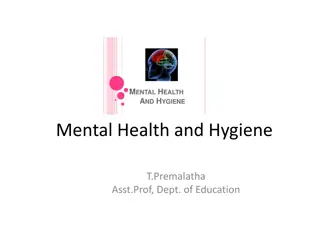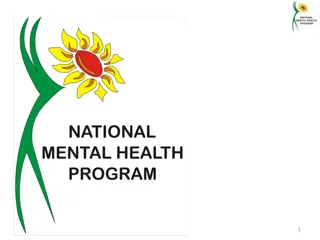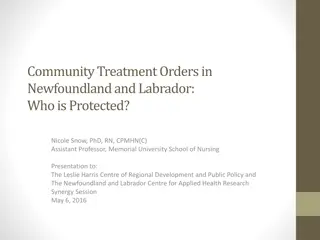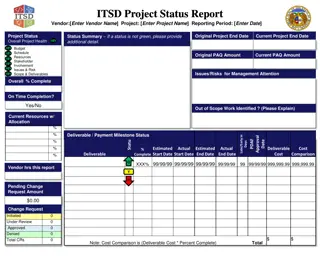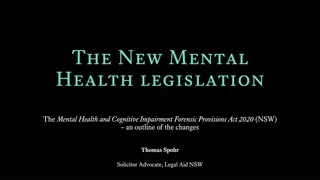Understanding Changes in Mental Status and When to Seek Help
Changes in mental status, such as confusion, memory loss, and behavioral alterations, can signal underlying health issues like infection, stroke, or brain injury. Recognizing these changes promptly is crucial for seeking timely medical assessment and care, especially when a person's health and safety are at risk. This guide outlines the signs of mental status changes and emphasizes the importance of seeking professional help when needed.
Download Presentation

Please find below an Image/Link to download the presentation.
The content on the website is provided AS IS for your information and personal use only. It may not be sold, licensed, or shared on other websites without obtaining consent from the author. Download presentation by click this link. If you encounter any issues during the download, it is possible that the publisher has removed the file from their server.
E N D
Presentation Transcript
DSP Supplemental Training: Changes in Mental Status Presented by the Office of Provider Development
Changes in Mental Status A change in mental status can refer to any changes in brain function resulting in Confusion Memory Loss Loss of alertness Unusual thinking Poor judgement Emotional changes Behavioral changes Personality changes 9/15/21 Virginia Department of Behavioral Health & Developmental Services 2
Changes in Mental Status There are many possible reasons a person experiences a change in mental status some examples include: Infection Fever Medications Low blood sugar Stroke Liver failure Alcohol or drug use Consuming toxic substances Dementia Lack of oxygen (Anoxia) Brain injury Concussion 9/15/21 Virginia Department of Behavioral Health & Developmental Services 2
Changes in Mental Status What s important is recognizing that a change has occurred and seeking medical assessment and care as soon as possible. If the person s health and safety is at risk contact 911 immediately. 9/15/21 Virginia Department of Behavioral Health & Developmental Services 2
Changes in Mental Status You might notice some changes in how a person speaks or acts that could indicate calling a medical professional is needed. For example .behavioral changes, walking pattern changes, changes in oral or hand motor control could indicate a need to seek medical attention. 9/15/21 Virginia Department of Behavioral Health & Developmental Services 2
Changes in Mental Status A person could . Forget what day it is Lose attention more easily Forget the names of things or people they know Repeat a question again shortly after answered Begin stumbling or falling Start drooling or have trouble swallowing are there changes in 9/15/21 Virginia Department of Behavioral Health & Developmental Services 2
Recognizing Change Physical function: How the individual moves or physically performs tasks? Memory: Remembering names, recent events or keeping up daily schedules? New confusion? Mood: New sadness, tearfulness, giddiness? Behavior: Increased agitation, hostility, anger, or acting out? Overall Health: What looks different compared to baseline? 9/15/21 Virginia Department of Behavioral Health & Developmental Services 2
What is baseline? Baseline is defined as a minimum or starting point used for comparisons. In relation to mental status, it refers to how a person typically is prior to experiencing changes. It refers to the beginning measurement of behavior. By knowing what is typical you can help identify when changes in their mental status or baseline occur, without baseline data, it s difficult to recognize changes 9/15/21
What is baseline? By talking to the individual, talking to those who know the individual and observation of the individual it can be helpful when changes occur to have an understanding of their baseline. 9/15/21
What is baseline? Think about what baseline means for the person? What is their typical mood on most days? Has this changed? What is their typical sleeping pattern on most nights? Has this changed? What is their typical communication style and pattern? Has this changed? What is their typical activity level? Has this changed? 9/15/21
What is baseline? Things to consider when determining a baseline change. If a change has occurred, does it occur across multiple environments? (Example at home and work/day program) If a change has occurred, has the individual seen their primary care physician? If a change has occurred, has the individual experienced any other changes recently in their life? (Example a recent move, a new housemate, death of a family member) 9/15/21
Recognizing Change Changes can be sudden or gradual Sudden changes require an immediate response Gradual changes can be discovered by making a list of what a person could do in past years and comparing it with what they can do now 9/15/21 Virginia Department of Behavioral Health & Developmental Services 2
Recognizing Change Asking those who know the person well if changes are apparent is an important way to identify gradual changes. 9/15/21 Virginia Department of Behavioral Health & Developmental Services 2
Recognizing Change It can be difficult to recognize mental status changes in people with developmental disabilities. People with DD are at risk for dementia as they age. This is especially true for people with Down syndrome who have a greater risk of developing the condition and to do so earlier in life. 9/15/21 Virginia Department of Behavioral Health & Developmental Services 2
Dementia Dementia is a general term that describes diseases and conditions that lead to loss of memory/learning skills and abilities to perform everyday activities. There are various types of dementia, for example: 9/15/21 Virginia Department of Behavioral Health & Developmental Services 2
Dementia Alzheimer s disease (a progressive neurologic disorder that causes the loss of brain cells; most common form of dementia; cannot be cured) Vascular dementia (caused by brain damage from impaired blood flow to the brain; can follow a stroke) Lewy Body dementia (related to protein deposits in the brain) Frontotemporal dementia (refers to a group of uncommon brain disorders that primarily affect the frontal and temporal lobes of the brain) 9/15/21 Virginia Department of Behavioral Health & Developmental Services 2
Dementia A professional assessment can include: Formal assessment tools Physical exam History and social factors Diagnostic tests 9/15/21 Virginia Department of Behavioral Health & Developmental Services 2
Dementia/Alzheimers Progression Early-stage (mild) - simple forgetting, trouble organizing Middle-stage (moderate) becoming lost, sleep changes, moody Late-stage (severe) loss of awareness, round the clock care 9/15/21 Virginia Department of Behavioral Health & Developmental Services 2
Dementia: Ways to support Simplify communication, be respectful Schedule events earlier in the day Calmly respond to frustration Limit noises and distractions Keep the environment clean and safe Slow down pace of speech Provide frequent breaks Maintain a consistent routine Remove throw rugs 9/15/21 Virginia Department of Behavioral Health & Developmental Services 2
Dementia: Ways to support Make it clear where things are Use clear containers or labels with pictures Use contrasting colors for doors and walls Avoid dark colors, reflective surfaces and busy patterns Use good lighting and natural light Establish consistent places for household and personal belongings Label dresser drawers and cabinets 9/15/21 Virginia Department of Behavioral Health & Developmental Services 2
Dementia: Ways to support Recent randomized controlled studies have shown the efficacy of music intervention in improving the well-being of individuals with dementia and their caregivers. Music can elicit emotions and memories and help provide a link to a person s past. Music can promote interconnection with caregivers and others with dementia. Musical training appears to delay cognitive decline and promote brain plasticity in the elderly brain. Music therapy can help agitation, as well as other recreational activities. People with dementia respond better with individualized activities including personally preferred music. 9/15/21 Virginia Department of Behavioral Health & Developmental Services 2
Dementia: Ways to support Create a life story with the person 9/15/21 Virginia Department of Behavioral Health & Developmental Services 2
Resources The National Task Group on Intellectual Disabilities and Dementia Practices https://www.the-ntg.org/publications The Eunice Kennedy Shriver Center https://shriver.umassmed.edu/programs/cdder/aging_idd_education/ The Alzheimer's Association https://www.alz.org/ The Social Care Institute for Excellence https://www.scie.org.uk/dementia/ Practical Neurology Music and Dementia: an Overview by Ronald Devere, MD https://practicalneurology.com/articles/2017-june/music-and-dementia-an-overview 9/15/21 Virginia Department of Behavioral Health & Developmental Services 2
Questions & Suggestions For more information, visit Provider Development online at http://www.dbhds.virginia.gov/developmental-services/provider-development 9/15/21 Virginia Department of Behavioral Health & Developmental Services 75







